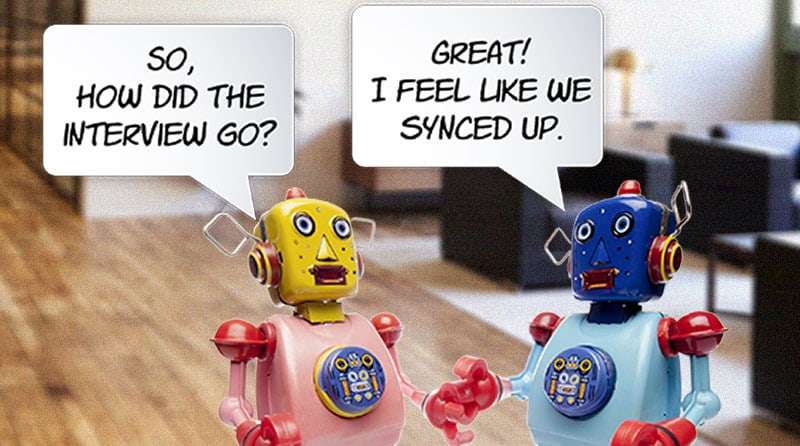At this very moment at a tech start-up in Silicon Valley or Mumbai software engineers are working on new methods to change the way candidates are found, sorted, and recruited.
AI is happening now, not just for the hospitality industry, for just about every job title imaginable from housekeeping to the executive suite.
The idea that human resources professionals will become displaced by hiring robots, or that your next job depends on the accuracy of a complex, yet intentionally unbiased algorithm, feeds into the dystopian narrative of hiring automation.
But let’s get something clear. Since the first job board (Dice) was launched in 1990 (Remember online bulletin boards accessed via a dial-up connection?) followed by the first hiring website (Online Career Center in 1992) the hiring process has been disrupted. Robots conducting interviews is just the next step.
Sorting vs Selecting
When resume scanning began it seemed like a good solution to a time-consuming problem. But once everyone figured out how to “keyword load” it became less effective. Still, sorting through hundreds of pages to find target applicants made sense.
For certain job categories and levels the “sort and select” process gets the job done and narrows the field of qualified candidates for the next tier of hiring, the first interview.
Jobs that do not depend on deep background and verified performance were the first to show success with keyword identification.
HireVue markets software for screening job candidates who sit in front of a camera and are asked a few questions. Down the line that software maps barely imperceptible changes in posture, facial expression and vocal tone.
Stephen Buranyi, reporting for The Guardian, spoke with Nathan Mondragon, head psychologist for HireVue. According to Mondragon the camera delivers images to the candidate that “takes note of barely perceptible changes in posture, facial expression and vocal tone.”
“We break the answers people give down into many thousands of data points, into verbal and non-verbal cues,” says Mondragon. “If you are answering a question about how you would spend a million dollars, your eyes would tend to shift upwards, your verbal cues would go silent. Your head would tilt slightly upward with your eyes.”
Eliminating Bias
There is promise in a hiring process that seeks to eliminate bias against race, religion, age, even physical characteristics. But in reality, those factors can still enter into the decision as soon as the first in-person interview takes place.
Bloomberg News reporters Rebecca Greenfield and Riley Griffin in their story “Can artificial intelligence take the bias out of hiring,” posted earlier this year concluded that recruiting bias is real and present. Greenfield and Griffin report that fewer than 5 percent of chief executives at Fortune 500 companies are women, and there are only three black CEOs.
“AI advocates argue the technology can eliminate some of these biases. Instead of relying on people’s feelings to make hiring decisions, companies such as Entelo and Stello IO use machine learning to detect the skills needed for certain jobs. Then AI matches candidates who have those skills with open positions,” they reported.
Interviewing Solon Borocas, an assistant professor in Cornell University’s Information Science department, said his own research has found that machine learning in hiring can result in unintentional discrimination. “Human decision-making is pretty awful,” said Borocas, but we should not overestimate the neutrality of technology, either.
Getting It Right
You would expect tech behemoths like Amazon.com to have this whole AI thing down. Not so much.
Just a year after testing is own AI hiring software, Amazon discontinued the experimental program that began in 2014 to use machine learning in its own hiring process. The company canceled the program after it discovered a bias against women.
Reuters News Service broke the story this October reporting that the algorithms seemed to prefer men. “Everyone wanted this holy grail,” said a person familiar with the effort. “They literally wanted an engine where I am going to give you 100 resumes, it will spit out the top five, and we will hire those.”
According to a 2017 survey by talent software firm CareerBuilder, 55 percent of U.S. human resources managers think AI will be a regular part of their work within the next five years.
In our own industry major players like Hilton Worldwide Holdings, Inc. (HLT.N) are already seriously invested in AI hiring.
Selling Automation to HR
Those start-ups I mentioned earlier are anxious to convince decision makers that they can lower costs in the HR department and maybe improve efficiency, by bringing automation to the table. Many of the largest companies have already pulled the trigger and are moving forward with the next generation of computerized hiring.
Anyone in the human resources profession is watching closely as AI moves into the recruiting process, and it will take some time to analyze the success of those new processes. But it is important to know what AI can and cannot do.
Harj Taggar, CEO and co-founder of Triplebyte a San Francisco-based recruiting platform works for Apple and Coinbase to help them find software engineers.
In an interview with CNBC.com’ s Karen Gilchrist, Taggar makes the claim that his service gives an opportunity for a more diverse pool of candidates by looking for a different set of data points that might otherwise be overlooked by human recruiters.
“The effectiveness of (human) recruiters is going down because recruiters are all chasing after the same pool of people,” Taggar told CNBC Make It. Taggar said traditional hiring practices can overlook otherwise good candidates.
But hiring software engineers who interface with machines is very different from employees who work with guests and understand the fine art of human interaction. In the hospitality industry, interpersonal skills are at the top of the list for many hotel and casino gaming jobs.
No question, there is an arms race for top talent in the hospitality industry, especially at the very top where companies like mine are trying to help put the right people in key positions. And it is not likely that AI or any type of automation will ever replace the human element in finding, recruiting and onboarding senior executive talent.
Dr. Charles Handler is a thought leader, analyst, and practitioner in the talent assessment and human capital space. He reminds us that when it comes to AI-based hiring assessment tools, we are presently at the bottom of the Technology Adoption Curve staring upward.
“Yes, innovation in AI-based assessments is happening, but the pace is slow. Massive sums of money are being invested because automating predictive hiring decisions while increasing their accuracy will result in billions if not trillions in ROI,” says Handler.
“Unfortunately, assessments are subject to the same factors that are limiting the advancement of AI in many areas. Chief among these is the fact that machines are not good at using abstract reasoning to perform complex-judgment-based tasks and infer deeper levels of meaning from data,” he concludes.
Handler thinks it will be a while before HR directors are replaced by robots. “We are still in the early days when it comes to AI based hiring technologies. Fully automated Hirebots are not yet able to best the tried-and-true model of measuring individual differences using psychometric tools.”
Experience and Insight Trumps Data Points
I will be the first to say that for many employers-in particular large companies-the ability to accept, scan, review, sort and categorize millions of resumes and applications is an essential part of filling many jobs. But when it comes to recruiting managerial talent, one-to-one engagement remains the gold standard.
Consider the number of hires that you may have thought were perfect, that went south in just a few weeks. No amount of code crunching could predict all of the situations that can arise with our species. We are human beings and we are complex.
No AI software, no matter how well engineered will be able to tell you that a candidate really wants to move back to Las Vegas because he is a big ice hockey fan. (Shout out to the Golden Knights!) Or will it factor into the equation how much it would mean to a senior CFO candidate to end his career in south Florida, or the Bahamas.
For human resources professionals the way we work will change, dramatically. We survived through the first dial-up online job boards, learned to live with Monster, Indeed, and other services that helped us reach far outside our hiring universe, with an ROI we might never have imagined.
It is more likely that our jobs will be easier, the way we accept, sort and communicate with candidates more efficient and our reach extended far beyond what we might have imagined just a decade ago.
But in the end, all of the robots in the world will not be able to make the human connection and feel the sense of enthusiasm and desire that the right candidate exudes. That is going to take someone like a HR professional to identify that potential.







